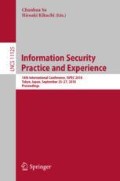Abstract
Threshold access structures of secret sharing schemes capture a scenario in which all the participants have the same weight (or power) and their contributions are equal. However, in some situations such as gradation among officials in an organization, the participants have different weights. Hierarchical access structures capture those natural scenarios, where different levels of hierarchy are present and a participant belongs precisely to one of them. Although an extensive research addressing the issues of cheater identifiability and robustness have been done for threshold secret sharing, no such research has been carried out for hierarchical secret sharing (HSS). This paper resolves this long-standing open issue by presenting definitions and constructions of both cheater identifiable and robust HSS schemes secure against rushing adversary, in the information-theoretic setting.
The second author is grateful to the NICT, Japan for granting a financial support under the NICT International Exchange Program.
Access this chapter
Tax calculation will be finalised at checkout
Purchases are for personal use only
Notes
- 1.
Family of hash function is adopted from [22]. But, the proof has been done independently to make compatible with the argument of the security proof of the proposed constructions.
References
Adhikari, A., Morozov, K., Obana, S., Roy, P.S., Sakurai, K., Xu, R.: Efficient threshold secret sharing schemes secure against rushing cheaters. IACR Cryptology ePrint Archive 2015/23 (2015)
Adhikari, A., Morozov, K., Obana, S., Roy, P.S., Sakurai, K., Xu, R.: Efficient threshold secret sharing schemes secure against rushing cheaters. In: Nascimento, A.C.A., Barreto, P. (eds.) ICITS 2016. LNCS, vol. 10015, pp. 3–23. Springer, Cham (2016). https://doi.org/10.1007/978-3-319-49175-2_1
Belenkiy, M.: Disjunctive multi-level secret sharing. IACR Cryptology ePrint Archive 2008/18 (2008)
Brickell, E.F.: Some ideal secret sharing schemes. In: Quisquater, J.-J., Vandewalle, J. (eds.) EUROCRYPT 1989. LNCS, vol. 434, pp. 468–475. Springer, Heidelberg (1990). https://doi.org/10.1007/3-540-46885-4_45
Carter, J.L., Wegman, M.N.: Universal classes of hash functions. J. Comput. Syst. Sci. 18(2), 143–154 (1979)
Cevallos, A., Fehr, S., Ostrovsky, R., Rabani, Y.: Unconditionally-secure robust secret sharing with compact shares. In: Pointcheval, D., Johansson, T. (eds.) EUROCRYPT 2012. LNCS, vol. 7237, pp. 195–208. Springer, Heidelberg (2012). https://doi.org/10.1007/978-3-642-29011-4_13
Choudhury, A.: Brief announcement: optimal amortized secret sharing with cheater identification. In: Proceedings of the 2012 ACM Symposium on Principles of Distributed Computing, pp. 101–102. ACM (2012)
Cramer, R., Damgård, I., Fehr, S.: On the cost of reconstructing a secret, or VSS with optimal reconstruction phase. In: Kilian, J. (ed.) CRYPTO 2001. LNCS, vol. 2139, pp. 503–523. Springer, Heidelberg (2001). https://doi.org/10.1007/3-540-44647-8_30
Ghodosi, H., Pieprzyk, J., Safavi-Naini, R.: Secret sharing in multilevel and compartmented groups. In: Boyd, C., Dawson, E. (eds.) ACISP 1998. LNCS, vol. 1438, pp. 367–378. Springer, Heidelberg (1998). https://doi.org/10.1007/BFb0053748
Kothari, S.C.: Generalized linear threshold scheme. In: Blakley, G.R., Chaum, D. (eds.) CRYPTO 1984. LNCS, vol. 196, pp. 231–241. Springer, Heidelberg (1985). https://doi.org/10.1007/3-540-39568-7_19
Kurosawa, K., Obana, S., Ogata, W.: t-Cheater identifiable (k, n) threshold secret sharing schemes. In: Coppersmith, D. (ed.) CRYPTO 1995. LNCS, vol. 963, pp. 410–423. Springer, Heidelberg (1995). https://doi.org/10.1007/3-540-44750-4_33
McEliece, R.J., Sarwate, D.V.: On sharing secrets and reed-solomon codes. Commun. ACM 24(9), 583–584 (1981)
Rabin, T., Ben-Or, M.: Verifiable secret sharing and multiparty protocols with honest majority. In: Proceedings of the Twenty-First Annual ACM Symposium on Theory of Computing, pp. 73–85. ACM (1989)
Roy, P.S., Adhikari, A., Xu, R., Morozov, K., Sakurai, K.: An efficient robust secret sharing scheme with optimal cheater resiliency. In: Chakraborty, R.S., Matyas, V., Schaumont, P. (eds.) SPACE 2014. LNCS, vol. 8804, pp. 47–58. Springer, Cham (2014). https://doi.org/10.1007/978-3-319-12060-7_4
Roy, P.S., Adhikari, A., Xu, R., Morozov, K., Sakurai, K.: An efficient t-cheater identifiable secret sharing scheme with optimal cheater resiliency. IACR Cryptology ePrint Archive 2014/628 (2014)
Safavi-Naini, R., Wang, H.: New results on multi-receiver authentication codes. In: Nyberg, K. (ed.) EUROCRYPT 1998. LNCS, vol. 1403, pp. 527–541. Springer, Heidelberg (1998). https://doi.org/10.1007/BFb0054151
Shamir, A.: How to share a secret. Commun. ACM 22(11), 612–613 (1979)
Simmons, G.J.: How to (really) share a secret. In: Goldwasser, S. (ed.) CRYPTO 1988. LNCS, vol. 403, pp. 390–448. Springer, New York (1990). https://doi.org/10.1007/0-387-34799-2_30
Tassa, T.: Hierarchical threshold secret sharing. J. Cryptol. 20(2), 237–264 (2007)
Tentu, A.N., Paul, P., Vadlamudi, C.V.: Conjunctive hierarchical secret sharing scheme based on MDS codes. In: Lecroq, T., Mouchard, L. (eds.) IWOCA 2013. LNCS, vol. 8288, pp. 463–467. Springer, Heidelberg (2013). https://doi.org/10.1007/978-3-642-45278-9_44
Traverso, G., Demirel, D., Buchmann, J.: Dynamic and verifiable hierarchical secret sharing. In: Nascimento, A.C.A., Barreto, P. (eds.) ICITS 2016. LNCS, vol. 10015, pp. 24–43. Springer, Cham (2016). https://doi.org/10.1007/978-3-319-49175-2_2
Wegman, M.N., Carter, J.L.: New classes and applications of hash functions. In: 20th Annual Symposium on Foundations of Computer Science, pp. 175–182. IEEE (1979)
Xu, R., Morozov, K., Takagi, T.: Cheater identifiable secret sharing schemes via multi-receiver authentication. In: Yoshida, M., Mouri, K. (eds.) IWSEC 2014. LNCS, vol. 8639, pp. 72–87. Springer, Cham (2014). https://doi.org/10.1007/978-3-319-09843-2_6
Author information
Authors and Affiliations
Corresponding author
Editor information
Editors and Affiliations
Rights and permissions
Copyright information
© 2018 Springer Nature Switzerland AG
About this paper
Cite this paper
Roy, P.S. et al. (2018). Hierarchical Secret Sharing Schemes Secure Against Rushing Adversary: Cheater Identification and Robustness. In: Su, C., Kikuchi, H. (eds) Information Security Practice and Experience. ISPEC 2018. Lecture Notes in Computer Science(), vol 11125. Springer, Cham. https://doi.org/10.1007/978-3-319-99807-7_37
Download citation
DOI: https://doi.org/10.1007/978-3-319-99807-7_37
Published:
Publisher Name: Springer, Cham
Print ISBN: 978-3-319-99806-0
Online ISBN: 978-3-319-99807-7
eBook Packages: Computer ScienceComputer Science (R0)

